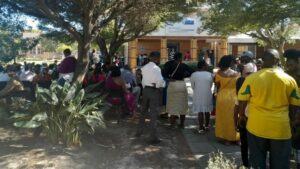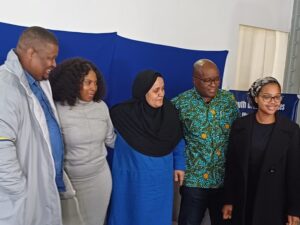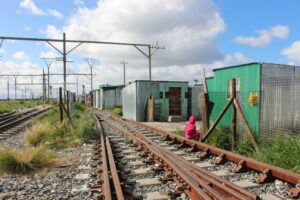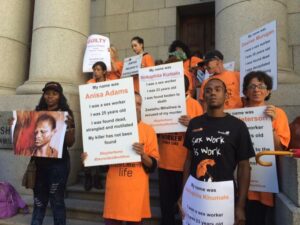Hundreds of Shaka’s Head informal settlement residents took to the streets of Ballito, on Monday 16 September, to protest planned evictions from the affluent town north of Durban. The march to the municipal offices, Nokukhanya Luthuli House, was led by Abahlali baseMjondolo and mobilised informal traders and unemployed workers from various communities. The target of their anger was KwaDukuza Municipality which in August was granted eviction orders that will affect approximately 900 families in Shaka’s Head. The evictions are currently being contested in the Pietermaritzburg High Court.
“We are protesting to stop the evictions and demand better living conditions,” said Mqapheli Bonono, deputy president of Abahlali. The municipality plans to relocate the evicted families 16 kilometres away to Vlakspruit, an area lacking services. “We are not against development, but we should be part of the conversation,” he added.
The protest was not only about housing but also addressed broader issues of inequality and racism. Both white and black elites are working together to oppress poor communities, said Bonono. “We are seeing private security and police being used to remove us from prime land, while wealthy areas like Ballito and Umhlanga receive special treatment.”
Residents said that instead of being forcibly removed, the municipality should provide secure land ownership and improve basic services like water and sanitation in the areas where they currently live. “For many of us, work is within walking distance, but if we are moved 16 kilometres away, it will be difficult and expensive to get to work,” said Lindikhaya Mcinka.
Ntombekhaya Ludziya, a Shaka’s Head resident, also voiced her concerns about the lack of consultation. “We only found out through a newspaper that we were being evicted. This shows how little they care about us,” she said. Ludziya also highlighted the impact on families: “Moving to a place with no schools or clinics will be very hard for us. Our children go to school here, and many people rely on jobs in Ballito.”
The protesters handed their memorandum of demands to Mbongeni Zondi, a representative of the KwaDukuza Municipality, who promised to pass it on to Mayor Lindile Nhaca and provide a response within seven days. Among their demands were land ownership, decent housing, the provision of basic services, and an end to all forms of discrimination. The group’s memorandum highlights the dire situation faced by many residents if evicted from land they consider ancestral. It states: “This municipality is forcefully removing us from the places we have made homes for our children. They have taken us to the courts but left the rich, and those whose ancestors committed crimes against humanity, untouched.”
The memorandum also calls for job creation, transparency in housing budgets, better access to education and healthcare, and protection for vulnerable groups such as women and the LGBTIQ+ community.
The protest also condemned the perceived collusion between the municipality and private businesses. “The KwaDukuza Municipality has shown that it is working for local private businesses and has forgotten it was elected to serve the poor. We suspect they take instructions from businesses to evict the poor. This must stop.” The movement stressed that the evictions represent a larger crisis in South Africa. “We have been left behind since 1994. We need an inclusive society where everyone is respected, has access to land, housing, and a fair share of the country’s wealth,” Bonono said.



